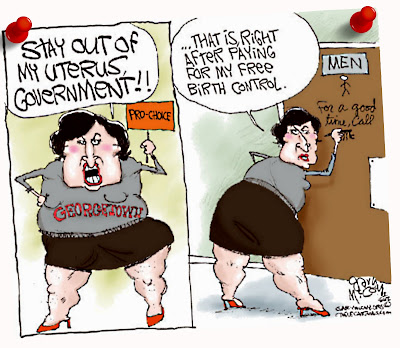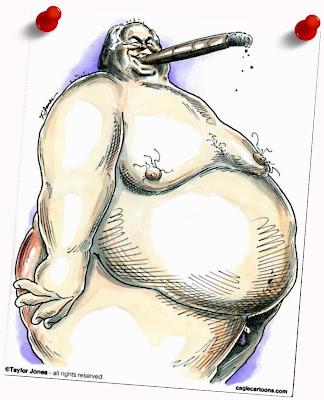This cartoon comes from the 1928 edition of the Baton Rouge High School yearbook, the Fricassee.
I first saw it some 37 years ago, when I was layout editor of the 1979 edition of the Fricassee. Some of us were going through the yearbook archives, leafing through all the old editions of our school's annual that we could find in the cluttered old cabinets of our cluttered old classroom . . . and there it was.
Even back in 1978 or '79, even for those of us Baton Rouge public-school kids, who went to segregated schools -- legally segregated schools -- until just eight years before, the cartoon was striking. Stunning, actually.
Yes, it was the open racism -- the naked, unvarnished and unapologetic racism. But more than that, it was that kids our age -- a decade or more before our parents would be that age -- would be that ugly, that publicly and that casually. This was something powerful enough to give pause to a generation, black and white, raised in the midst of, then in the dark shadow of, Jim Crow.
We had grown up with the crazy aunt in the Southern attic. For many of us, the N-word was something we heard every day. For others of us, the N-word was something used to describe us every day.
 |
"Humor" from the 1924 Fricassee (Click to enlarge)
|
FOR SOME OF US, rank hypocrisy was a virtue that our culture had developed in the years since 1928. Southerners of a certain age can explain to you . . . well, can try to explain to you how there are worse things than being a damned, two-faced hypocrite. For instance, one worse thing is not being one.
Another worse thing is white Baton Rouge, circa 1928 -- of living with a horror you cannot experience as horror at all.
Can you imagine the wretchedness of living with a conscience that dead? Or, more charitably, a conscience that unformed and uninformed?
Is there much in this world worse than glib, cheerful and constant evil that one commits, thinking of it all the while as an obvious virtue?
Oh, I imagine many people today could imagine that . . . if only they were self-aware enough to realize they're living it.
AT ABOUT the time we on the Fricassee staff were getting acquainted with just how far our forebears could let their racism and bigotry hang out, Kansas (the rock group, not the state) had a Top-40 hit, "Dust in the Wind."
I close my eyes, only for a moment, and the moment's gone
All my dreams pass before my eyes, a curiosity
Dust in the wind
All they are is dust in the wind
Same old song, just a drop of water in an endless sea
All we do crumbles to the ground though we refuse to see
Dust in the wind
All we are is dust in the wind
ALL THE STAFF of the 1928 Fricassee were dust, and to dust they have returned, no doubt. All their hopes, all their dreams, most of their works . . . dust.
That cartoon? It endures. There it is, frozen in time to judge and be judged.
We see the thing today, and we proclaim judgment on that which now is dust. The thing itself, it emerges from nearly nine decades past to stand in yellowing witness to a creator and a culture. To dust . . . dust from the ash bin of history.
That casual racism, the glib reduction of those unlike themselves to objects of ridicule, belies the notion that for some, others are indeed The Other, and The Other is less human than oneself, or perhaps not human at all. And if a group is less human than oneself, or not human at all -- and certainly if they're less powerful -- you can do whatever you like to them.
That's human nature. That's our fallen condition, and it's as old as Adam. We, of course, don't recognize -- or refuse to admit -- that, because Baton Rouge High, 1928.
Because Selma, 1965.
Because Birmingham, 1963.
Because Montgomery, 1954.
Because Berlin, 1933.
Because Fort Sumter, 1861.
Because. Just because.
SO HERE we stand, Donald Trump, 2016. Many American whites have decided that old hatred is the new black, and we get to be as ugly, and bigoted, and in your face as we want because a rich, vulgarian scumbag of a real-estate tycoon and reality-TV star is "telling it like it is."
"Telling it like it is" isn't, of course. Instead, it's just more of those same old lies that we prefer to hear -- the stinking spiritual and mental garbage we find so much more palatable than the God's honest truth.
Today, "fighting political correctness" just means we no longer have to bother with the virtue of rank hypocrisy, that mechanism through which malefaction pays backhanded tribute to virtue. Nowadays, we prefer our evil straight up.
"Telling it like it is" brings us back to Fricassee 1928. "It pays to read the signs."
 |
A bit of virtuous hypocrisy from the depths of Jim Crow . . .
an ad from the 1952 Pow-Wow, the yearbook of Baton Rouge's
Istrouma High School. Click on the ad to read. |

























